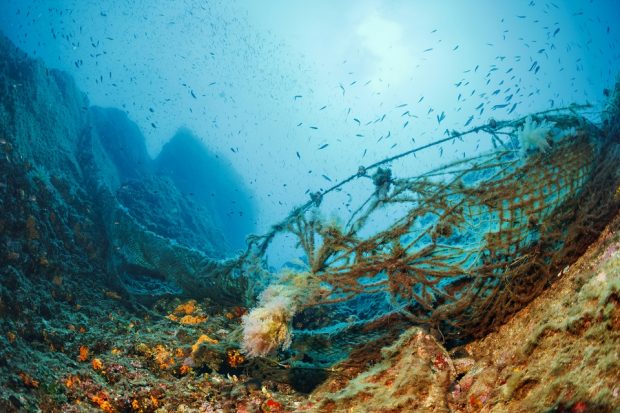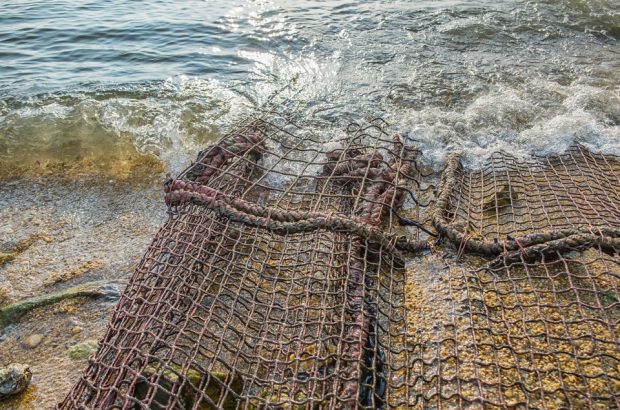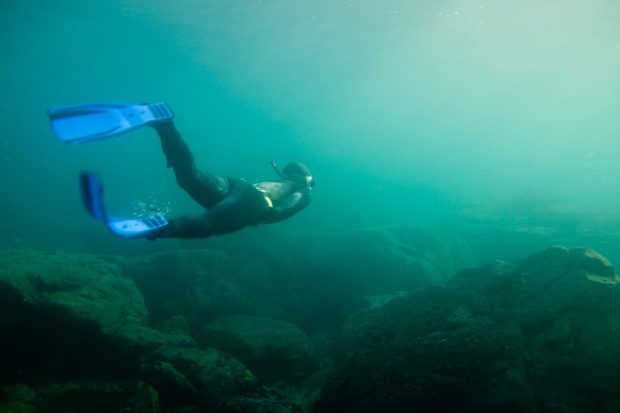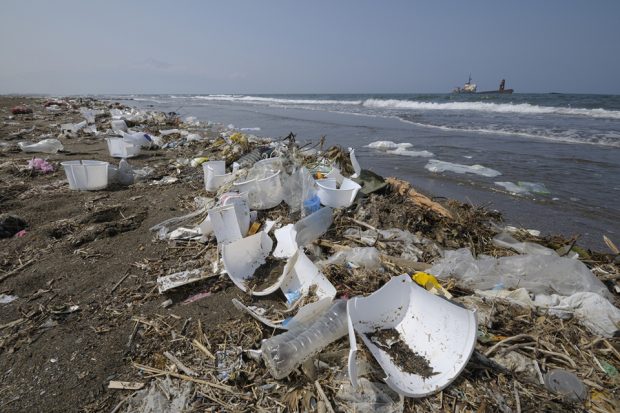Our Senior Marine Licensing Manager Matthew Kinmond answers this question.
We have been very busy in marine licensing at the moment but particularly with enquiries about abandoned, lost and discarded fishing gear (Ghost Fishing) from the sea bed. I wanted to provide some additional information about the licensing requirements of this activity.

Is a marine licence required to remove items from the seabed?
A licence is required. The current MMO guidance on the British Sub Aqua Club (BSAC) website states that the only exception to this rule is using a lifting bag to remove an object up to 100kg that has been on the seabed for less than 12 months or when it is ‘contemporaneous’ marine litter up to 100kg.
The use of the word ‘contemporaneous’ is quite vague and could be interpreted in different ways. We provided some extra direction on the activities this guidance should be applied to, in order to make sure everyone is interpreting it in the same way.
So what have we done?
Firstly we have replaced the wording ‘contemporaneous’ with: ‘litter that has been on the seabed for less than 12 months to make it clearer to people whether they need a marine licence. Secondly we have clarified that from a marine licensing perspective we are treating abandoned, lost and discarded fishing gear differently to other marine litter.
That’s the technical bit but it raises the valid query of why we have this rule when the removal of lost, abandoned and discarded fishing gear protects the marine environment?

Protecting the marine environment
It is true in most cases that the removal of abandoned, lost and discarded fishing gear should protect our marine environment. We appreciate that the diving community and other people who undertake this activity do so on a voluntary basis because they care about our marine area and want to protect it. This is one of many things that the MMO and the diving community have in common. We both care passionately about our marine area and want to preserve it.
However, people operating in the marine environment have varying levels of experience and knowledge. Activities such as the removal of abandoned, lost and discarded fishing gear has the potential to negatively affect our seas and therefore requires more consideration. We recognise that it is never intentional to damage any of the sensitive features found at the sites where these activities are undertaken. However there can be unintended impacts that we want to mitigate.
The risks involved
To illustrate some risks in practice around the UK there are marine protected areas that protect species such as pink sea fans, long lived bivalves and the ocean quahog. The MMO has a responsibility to ensure that human activity does not have an adverse effect on any protected feature within our marine protected areas, but removing gear inappropriately could cause an impact to these species that are sensitive to abrasion.

There are also potential risks to the historic marine environment including interference or disturbance of these features as well as possible impacts to the structural integrity of the features that the gear is snagged on, or impacts to features in the surrounding area that may be unknown to the person undertaking the work.
The additional checks undertaken through the marine licensing process ensure effective management of our marine protected areas and the historic environment, enabling future generations, including divers, to continue to enjoy our marine environment.
Simplifying the licensing process
We have made every effort to make the process as simple as possible. However we are keen to continue to engage with the relevant stakeholders so we can continue to improve the marine licensing experience. An example of this is the launch of the self-service marine licencing which helps to reduce the licensing fee to £50 (historically it was £175) and speed up the consenting process for multiple sites at once.
We also continue to work with the diving community to find ways forward in respect of our marine licensing approach and it may be that this leads to a revision of the current procedures.

Thank you for your help
However, for now we are very grateful for the efforts of volunteers, divers and others who care about our marine environment and we ask that they continue their activities having first sought a licence from us – which in the majority of cases will go through the self-service marine licensing. In this way we can all continue to work together to mutually protect the marine area we care so passionately about.

27 comments
Comment by M Rowley posted on
Absolute nonsense! You are taxing the removal of litter and now you attempt to justify that tax and the stupid bureaucracy needed to impose it by the most ridiculous assertions.
You have no prospect of policing this, I suspect most divers will continue to ignore your ill informed legislation as they have done since it was launched.
I have written to my MP protesting this idiocy as I'm sure many divers are doing. Expect to receive many questions from MPs.
Comment by Dianna Tregenza posted on
Perhaps you should be fining the fishing industry for leaving these death traps in the first place and let them offset any licensing fees?
I am a regular beach cleaner, we remove loads of rope from our beaches. In some cases where it's been washed thousands of minute fibres break apart from even the smallest rope. It is a major contributor to microplastics in the marine environment. Early this year I spoke to a leading marine plastic expert from Plymouth University. He told me that nothing is being done about ghost gear and that the conversation isn't being had.....I hope this has changed since January this year especially given the first filming of a plankton worm eating a microfibres and it's immediate death. How long will we continue to sidestep the catastrophic loss in plankton?.....we already have a 50% loss in the last few decades. A major result of marine litter, including ghost gear. With so much of our oceans playing a major role in oxygen production and the absorption of CO2.... I'd like to know exactly why ghost gear is a conversation not being had let alone rectified.
I await your update, thank you.
Comment by Peter Bedson posted on
Hi Dianna
Watch out - unless you are a local authority you need a licence for beach cleaning too!
The world has truly gone mad - I assume that the MMO has to recover its costs from its "customers" hence the need to licence as much as possible to collect all those fees otherwise they wouldn't be able to pay their staff.
Comment by Tony posted on
My question is a simple one.
Why are the government penalising legitimate groups of willing volunteers, who want to clean up the seas around the coastline of the UK. By making them apply for a costly licence that they can I'll afford? These volunteers already have to pay for their equipment, servicing and gasses, accommodation, boat hire, carry out surveys prior to the removal of these nets. Please do not expose them to more red tape and additional costs.... Unless the government wants to dig deep and pay for these groups to do the work!
Comment by Matt posted on
Do you have evidence that volunteer workers damage the marine environment? If not, does the potential damage from volunteers outweigh the damage caused by marine litter/abandoned fishing nets? If "the MMO has a responsibility to ensure that human activity does not have an adverse effect on any protected feature within our marine protected areas" then surely marine litter/abandoned fishing nets are human activities?
Comment by Kerry Lewis posted on
How does me paying you £50 through self service before I recover a lost fishing net or lobster pot make any difference to the protection of the marine environment? What impact will having the licence have on how I go about recovering the net, or the pot, or what I do with afterwards? What is the £50 for? Do you not thinking that asking me to pay £50 is going to make me less likely to do something constructive and useful, and instead just leave the net drifting, or the pot ghost fishing?
Comment by Bev.Robinson posted on
Absurd.
Comment by Diver posted on
Very helpful, thank you Matthew!
Comment by Mike Heylin posted on
So exactly who determines how long a piece of fishing litter has been in place? If it is less than twelve months a licence is not required but if it is more than twelve months a licence is required. Have I understood that correctly?
Comment by Alan Deeming posted on
It would be nice if this could clarify any differences between abandoned commercial fishing gear & the occasional lost angling related terminal tackle & line. The latter is being interpreted in some quarters as coming under the heading of abandoned fishing gear which I doubt is the intention of the MMO.
Comment by Jean-Marc Jefferson - Chair Maritime Archaeology Sea Trust posted on
I'm sure the diving community fully understands the need to regulate and therefore licence Ghost fishing gear, for all the reasons given above. What they will find difficult to accept is that they have to pay for the privilege of doing so - given the voluntary nature of the activity. If the MMO were to grant free licences, it would go a long way to restoring positive collaboration.
Comment by Nicole posted on
Ridiculous legislation, almost impossible to effectively police, but designed so it will catch some poor diver out and they'll be prosecuted as an example.
The idea of applying for a license in advance of every dive in case I happen upon some gear or a lost pot is absurd. Credit the divers a bit, they are going to remove the net as carefully as possible and ensure minimal impact on the area, and save from future impact.
Disappointed the BSAC have been involved and not called this out for the poor, petty bureaucracy it is.
I am sorely dissatisfied that my membership fees and taxes go on the idiots that came up with this.
Comment by Michele posted on
Utterly ludicrous. This is one of the reasons the rest of the world laughs at us.
Do you have ANY evidence of cases where removal of abandoned fishing gear have damaged he environment? Not hypothetical scenarios, actual eocuments cases.
There are plenty of documents cases of marine fauna being killed by abandoned garbage.
I for one, will continue removing gear, and have no intention of getting a license.
We all make mistakes, I think it's high time that whoever came up with this idea admits they made a mistake and rectifies it.
Comment by Peter Bedson posted on
This wins the internet award for self-serving twaddle - congratulations! Its a pretty high bar to beat but you managed it - and without using the phrase "to better serve you" too.
Comment by A Diver posted on
How does one tell the age of discarded fishing gear? Do you also have a law to leave a date discarded tag on the gear? A best before date?
Comment by David posted on
This article is a load of hogwash. These people are nothing more than self-appointed bureaucrats trying to justify their existence (and pay) at the expense of the people who are ACTUALLY helping the environment. They should go find a nearby tree that is processing the oxygen they are consuming and make an apology to it. They should be ashamed of themselves.
Comment by Zak Sherlock posted on
In addition to Jean-Marc's comment, why not provide information, so that divers can know when to seek additional guidance from the MMO.
This could be as simple as a website/document showing the species/circumstances (pictures, descriptions etc).
A small up front effort could reduce the need for a lot of pointless process/paperwork downstream.
Comment by Rod Fransham posted on
I can see no point to this fee, any diver who retrieves ghost nets and gear will take utmost care where these are snagged on sea fans and marine flora.
What purpose will a fee or tax serve other than to deter anyone from trying to clear up this mess. I understand that nets and fishing gear can get lost but damage is being done to the marine environment through bottom trawling and may be where nets and gear become snagged and lost. Perhaps this should be looked into.
Comment by Amy Wardlaw, MMO posted on
Hi Rod, thanks for getting in touch. This is indeed being looked into, you might be interested in the British Sub Aqua Club's (BSAC) recent update on this https://www.bsac.com/news-and-blog/retrieving-ghost-fishing-gear/
Comment by John posted on
1 How does obtaining an MMO licence reduce the risk to species such as pink sea fans, long lived bivalves and the ocean quahog?
2 Is the alleged risk to species such as pink sea fans, long lived bivalves and the ocean quahog the best reason the MMO can table for enforcing licensing?
3 How does obtaining an MMO licence reduce the risk to species in unprotected areas?
4 What evidence is there of greater damage to the environment being done by unlicensed divers than that which was being done by the abandoned nets in the first place?
5 What difference is there in removing for example, abandoned nets, on land and underwater, that requires a licence to do it underwater?
Comment by carlharvey posted on
Hi John
The removal of items from the sea bed including abandoned lost and discarded fishing gear does not require a marine licence where that removal takes place by hand.
Where a vehicle vessel aircraft, marine structure or floating container (including an airbag) is used to make a removal the marine licensing regime is engaged.
The Marine and Coastal Access Act 2009 (MCAA 2009) established the MMO. Part 4 of MCAA 2009 came into force in April 2011 and made it a marine licensable activity to use a vehicle, vessel, aircraft, marine structure or floating container to remove any substance or object from the sea bed within the UK marine licensing area. Recognising that the order captured some routine activities carried out by divers, including removing items of litter, the MMO worked with DEFRA and BSAC to provide guidance on what minor activities considered did not to require a licence. It should be noted that the MMO must take decisions in accordance with the relevant legislative and policy framework; we have no policy remit nor power to make activities licensable or to deregulate them of our own accord.
The guidance was hosted on the BSAC website. In the summer of 2017 it came to light that divers were interpreting the BSAC guidance differently and some were confused about when a licence was needed. The MMO recognises that the guidance could be clearer and has committed to working with BSAC to produce better guidance. The MMO met with BSAC, Ghost Fishing UK, the Global Ghost Gear Initiative and Forth Element at the end of 2017 to explore the issues. It is hoped that revised guidance will be issued early in 2018.
To be clear the current position is simply that:
• Removal of ALDFG by hand does not require a licence.
• Removal of ALDFG using an airbag with a lifting capacity up to 100KG does not require a licence provided the gear to be removed does not appear to have been on the sea bed for more than 12 months.
This means:
• Using an airbag to remove gear which appears to have been on the seabed for longer than 12 months does require a licence
• Removing ALDFG which requires an airbag with a lifting capacity greater than 100KG does require a licence irrespective of how long the ALDFG appears to have been on the sea bed.
We hope this helps with your query.
Kind regards
Marine Management Organisation
Comment by David posted on
carlharvey posted onon 02 February 2018
"The removal of items from the sea bed including abandoned lost and discarded fishing gear does not require a marine licence where that removal takes place by hand."
Thank you Carl for the clarification on this piece here. When I first read it I had a lot of questions but that helped.
Founder of https://www.tackle.org
Comment by Muskie Jason posted on
carlharvey, thanks for clarifying. With so much trash in the ocean, this is certainly an important topic. As founder of https://tigermuskie.net I am a lover of all of our natural waterways and I want to see them protected.
Comment by Richard Delaney posted on
It's truly sad how much trash is in the ocean. I fear that we may have already done irreversible damage to the ecosystem. In fact, there was an article the other day about how a top diver/researcher believes that the Great Barrier Reef is about to go extinct. Sad.
Richard
Founder of https://muskyusa.com/
Comment by Lucy posted on
Are there any UK laws surrounding ghost gear? I cant find anything that states that fishing companies disposing of fishing gear in the oceans is illegal? Obviously this outlines the regulations on removing ghost gear, but doesn't highlight on punishments for ships that put it there.
Would be grateful if anyone could help me find this.
Comment by carlharvey posted on
Hi Lucy
Thank you for contacting us.
Fishermen already have the obligation (Council Regulation (EC) No 1224/2009) to retrieve or report lost gear.
https://eur-lex.europa.eu/legal-content/EN/TXT/?uri=CELEX:32009R1224
Article 48 explains this in more detail.
Kind regards
Marine Management Organisation
Comment by Lucy posted on
Thankyou so much for your help Carl!
Lucy